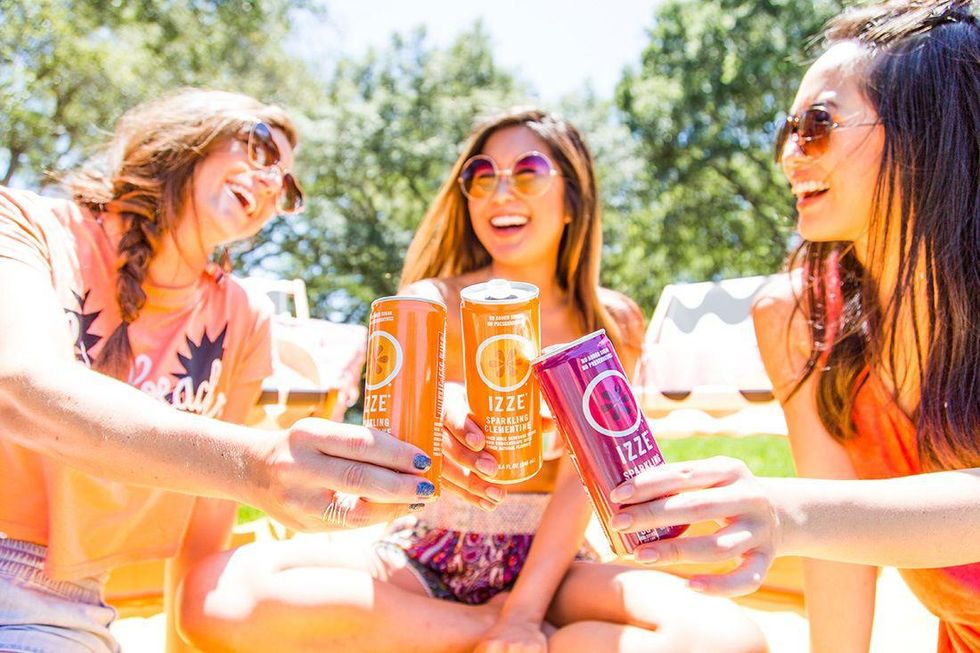
In recent years, topics like nutrition and exercise have evolved to become more about self-care than self-punishment or harsh rules. As a society, we've awakened to the fallacies of diet culture and body shaming, and have come to embrace a healthier perspective rooted in the benefits of intuitive eating, mind-body practices, and exercise as self-care. So why should drinking alcohol be any different? Although some people find alcohol is a nonstarter for them and better avoided completely, others may fall into a middle-ground camp, wondering if the sober curious movement or mindful drinking could be a reasonable approach.
It's unfortunate that attitudes around drinking have evolved into an all-or-nothing mentality. If you've ever been simply trying to cut back and had to justify your decision to your pals ("But why aren't you drinking?! You were drinking last weekend!") you already know how hard it is for people to wrap their minds around drinking on some days and socializing sober on others. But why shouldn't we approach drinking alcohol like we try approach nutrition, as all about balance and moderation?
We sat down with Nick Allen, co-founder of Sunnyside, a mindful drinking coaching app, to talk about shifting the conversation around cutting back from a focus on total sobriety and what we might miss out on, to a point of view that more mindful drinking equals more energy, healthier bodies and minds, and more chances for deeper connections with others.

How do you know if you're drinking too much? What are some signs you should cut back?
Nick: The first thing to know is if you feel like you're drinking more than usual, especially in the last two years, you're not alone – {a lot of} people drank more in 2020 than in years prior (for obvious reasons). And if you're thinking about proactively managing your alcohol health, you're already taking steps in the right direction. You don't have to feel like you have “a problem” in order to want to proactively manage this key pillar of your health. There are a few things you can look out for, though:
- If your tolerance has gone up, that can sometimes be an indicator you're drinking more than your usual amount. If it takes more drinks to get to your desired “buzz” than before, that means you've gotten less sensitive to alcohol and its effects.
- We all have situational triggers during the day, but if your reaction to one of those triggers is a strong urge to drink, you might be drinking a bit more than is considered “healthy” or “social.”
- If you're having trouble sleeping, this could also be a sign of drinking too much. Alcohol blocks your REM sleep, which can throw off your body’s internal clock, so you wake up feeling less rested.
- Most importantly, if you're drinking for relief rather than enjoyment, that can be a {red} flag. Think of alcohol as an amplifier of fun rather than a pain reliever. If it starts to become more of the latter, or you're drinking to escape boredom, stress, or pain, that's a good indicator it might be time to consider a more mindful approach.
For those who do get started, the all-or-nothing mindset can still create problems along the way. Movements like Dry January are great entry points into more mindful drinking, but what we observe among our members is that even a single drink can derail these efforts, since the goal is zero.
At Sunnyside, we advocate for proactively managing drinking in the same way we've learned to manage diet, exercise and mindfulness. Like with junk food, workout goals and meditation practices, slip ups with drinking are expected here and there, and not a reason to give up entirely. What’s most important is that we keep working towards the goal, and don't let setbacks discourage us from the long-term purpose of living a healthier, more fulfilling life.
One last thing I'll note is that personal systems for healthier drinking habits are notoriously flaky. Many getting started on the path to healthier drinking create arbitrary rules for themselves, like “No hard alcohol”, “No drinking on weekdays”, or “No drinking at home.” These rules work for awhile, but get less effective overtime, leading to a high percentage of people reverting to old habits. At Sunnyside, we’ve seen that having a more flexible, long-term system of planning ahead, tracking each drink, and working on replacing old habits with new routines is a more sustainable solution for lifestyle change that sticks.

What are some tips for reducing your drinking if you're struggling because your partner or friends are not doing so?
Nick: Mindful drinking is inherently about bettering yourself and putting your health in the priority slot. While your family, friends or partner may not be actively pursuing mindful drinking in the same way you are, framing your effort as an investment in your wellness is a great way to get them onboard with the journey.
The beauty of mindful drinking (vs. complete sobriety) is that you can still have an active social life, but with more intention. One of the best parts of mindful drinking is that it leads to mindful engagement. When you look at socializing as a means of connection rather than aiming to get a buzz, you'll likely connect more deeply with your friends and enjoy yourself even more. We’ve seen time and time again that when one person in a friend group becomes a champion for more thoughtful social drinking, others jump on board. The result is deeper, more meaningful connection that fills your cup more than ever. We encourage your readers to be the catalyst in their friend groups, so they can see for themselves!
Are you sober curious or interested in mindful drinking? Share your experience with us @BritandCo, and don't forget to subscribe to our newsletter!
0 Commentaires